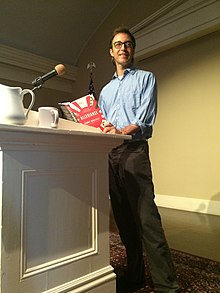|
Kermit Roosevelt III
Kermit Roosevelt III (born July 14, 1971) is an American author, lawyer, and David Berger Professor for the Administration of Justice at the University of Pennsylvania Law School. He is a great-great-grandson of U.S. President Theodore Roosevelt and a distant cousin of President Franklin D. Roosevelt.[1] Early life and educationRoosevelt was born in Washington, D.C., on July 14, 1971. His father, also named Kermit, was a son of Kermit Roosevelt Jr. and a great-grandson of President Theodore Roosevelt.[1] He graduated from St. Albans School (where he was a Presidential Scholar),[2] Harvard University, and Yale Law School.[3] He was a law clerk for Judge Stephen F. Williams of the D.C. Circuit, and clerked for U.S. Supreme Court Justice David Souter.[4] CareerRoosevelt worked as a lawyer with Mayer Brown in Chicago from 2000 to 2002 before joining the Penn Law faculty in 2002.[4] He was an assistant professor, from 2002 to 2007, and Professor of Law (Conflict of Laws, Constitutional Law), from 2007 to 2021, when he was appointed as David Berger Professor for the Administration of Justice.[5] Roosevelt's areas of academic interest include conflicts of law and constitutional law. His articles have been cited twice by the United States Supreme Court and numerous times by state and lower federal courts.[citation needed] His scholarly publications include "Resolving Renvoi: the Bewitchment of Our Intelligence by Means of Language," University of Notre Dame Law Review (2005).[6] Roosevelt has also written two novels, both of which dramatize legal settings. His TEDx talk (June, 2016) is entitled "Myth America: The Declaration, the Constitution, and Us."[7] ActivitiesIn May, 2016, Roosevelt and Karen Korematsu (daughter of a prominent American opponent of Japanese-American internment during World War 2) were featured speakers at a National Constitution Center program. It is the first time a member of the Roosevelt family and a member of the Korematsu family appeared in a public forum.[8] Roosevelt is a Distinguished Research Fellow of the Annenberg Public Policy Center at the University of Pennsylvania[9] and a member of the American Law Institute.[10] In November 2014, the American Law Institute announced that Roosevelt had been selected as the Reporter for the Third Restatement of Conflict of Laws.[11] Reception of novelsRoosevelt's first novel, In the Shadow of the Law, had generally positive reviews. It was a Christian Science Monitor Best Book of the Year.[12] Alan Dershowitz, writing in The New York Times, said that the book "suffers from the showoffy-ness of an aspiring artiste" but recommended it "with real enthusiasm" because its critique of legal firms "rings true of all too many corporate law factories."[13] Roosevelt's second novel, Allegiance, published in 2015, was a Harper Lee Prize finalist. It received favorable reviews in The Wall Street Journal ("well worth reading") and The Richmond Times-Dispatch ("splendid, troubling, and authoritative") and a starred review from Publishers Weekly.[14][15][16] The story examines U.S. national security policies during World War II, focusing on President Franklin D. Roosevelt's Executive Order 9066, which authorized the internment of Japanese Americans.[17] BooksNonfiction
Fiction
See alsoReferences
External links |
||||||||||||||
